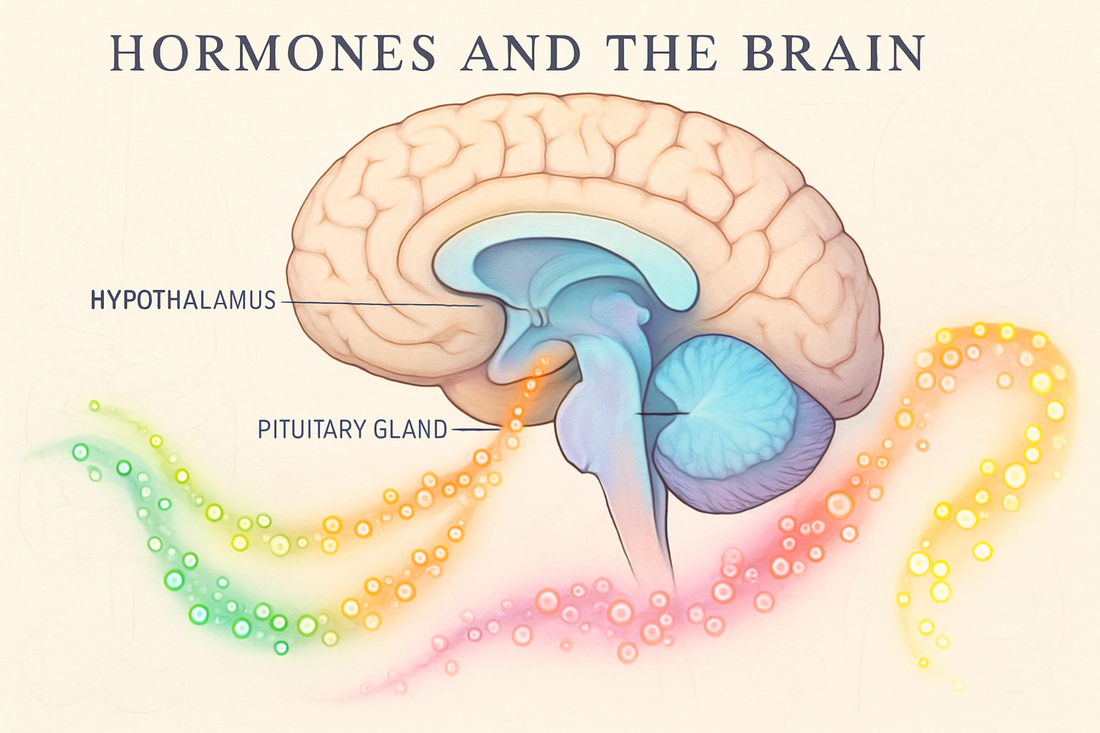
How Hormones Affect Our Brain: The Neuroendocrine Connection
Share
How Hormones Affect Our Brain: The Neuroendocrine Connection
Your brain is not separate from your hormones—it is both shaped by them and a master regulator of them. From mood to memory, focus to emotional regulation, hormones like estrogen, progesterone, cortisol, and thyroid hormones have profound effects on the structure and function of your brain.
When these hormones fluctuate—as they do during menstruation, postpartum, perimenopause, or times of stress—so too can our mental clarity, emotional stability, and cognitive performance. Understanding this neuroendocrine connection is essential for women seeking deeper self-awareness and long-term health.
Your Brain: A Hormonal Target and Control Center
The hypothalamus and pituitary gland, located in the brain, regulate the release of key reproductive and stress hormones by communicating with your ovaries, adrenals, and thyroid. But hormones also travel back to the brain, influencing:
- Neurotransmitter balance (serotonin, dopamine, GABA)
- Synaptic plasticity (learning and memory)
- Neuroprotection and regeneration
- Emotional processing in the amygdala and prefrontal cortex
Estrogen: The Brain’s Mood & Memory Modulator

Estrogen receptors are found throughout the brain, particularly in areas involved in cognition and emotion, like the hippocampus, amygdala, and cerebral cortex.
Estrogen helps:
- Boost serotonin and dopamine production (feel-good neurotransmitters)
- Support synaptic plasticity, essential for memory and learning
- Regulate HPA axis response to stress
- Offer neuroprotection against age-related decline
Science Insight:
A 2023 study published in Nature Mental Health revealed that estradiol fluctuations during the menstrual cycle affect medial temporal lobe volume—a brain area critical to emotion and memory. This is one reason many women experience brain fog, anxiety, or mood shifts at different phases of their cycle.
Progesterone: The Calming, Sleep-Supportive Ally
Progesterone interacts with GABA receptors, promoting relaxation, emotional regulation, and sleep quality. When progesterone levels drop in the luteal phase or during perimenopause, symptoms like anxiety, irritability, and insomnia can intensify.
Herbal support like Vitex (which boosts luteal progesterone) and Ashwagandha (which enhances GABA response) can help restore nervous system calm.
Cortisol: The Disruptor (or Defender) of Mental Clarity
Cortisol, your body’s stress hormone, can enhance focus in short bursts—but chronic elevation leads to:
- Impaired memory and concentration
- Increased anxiety or low mood
- Suppressed estrogen/progesterone production
- HPA axis dysregulation
Herbs like Ashwagandha and Licorice root act as adaptogens, protecting the brain from stress-related damage and supporting cortisol balance.
Thyroid Hormones: The Metabolic Drivers of the Mind
Low thyroid hormone levels (T3, T4) can cause:
- Brain fog
- Sluggish thinking
- Depression or flat mood
Women are disproportionately affected by thyroid disorders, particularly after childbirth and during perimenopause. Supporting the thyroid with adaptogens, selenium-rich foods, and reducing endocrine disruptors is crucial.
Hormonal Health Is Mental Health
The outdated model of separating reproductive health from mental health has failed women for generations. Hormones are not just about periods—they are biochemical messengers that guide mood, motivation, and memory.
At This Wombman, we encourage women to take a neuro-hormonal approach to wellness—supporting the endocrine system with herbal allies, nutrition, rest, and education.
Our Hormone Balance Tincture is designed to nourish this brain-body connection using herbs like:
- Ashwagandha for HPA axis balance
- Vitex for progesterone and dopamine modulation
- Black Cohosh and Dong Quai for estrogen receptor support
- Licorice Root for adrenal and cognitive clarity
When Your Brain Feels Off, Check Your Hormones
If you're experiencing anxiety, forgetfulness, fatigue, or mood instability—it may not be “just stress” or “just getting older.” It may be your body asking for hormonal support.
With the right tools and awareness, you can reclaim not just hormonal balance—but mental resilience and clarity.

